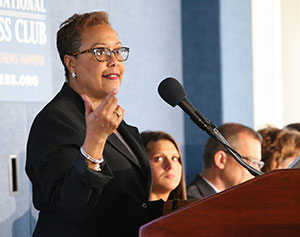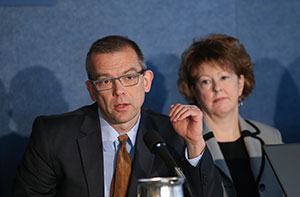National Briefing Heralds Launch of edTPA, Releases Field Test Data

On November 8, AACTE marked the national launch of edTPA with a briefing in front of a standing-room-only audience at the National Press Club in Washington, DC. A report released at the briefing presents results of 2 years of field testing and recommends a passing score for edTPA, the first preservice performance-based assessment available to every educator preparation program across the country.
The briefing’s panelists—including a classroom teacher who completed edTPA in her preparation program, a teacher educator, state policy leaders, and edTPA partners—celebrated the new measure of teaching readiness as evidence that the teacher preparation profession is taking control of its future. Panelists said using edTPA as part of a multi-measure assessment system encourages continuous improvement by both candidates and programs, and it strengthens partnerships between the PK-12 community and teacher preparation programs. They also agreed that implementing the assessment with integrity will take time and the engagement of all stakeholders.
Panelist Dennis Van Roekel, president of the National Education Association (NEA), said the use of assessments such as edTPA supports the NEA’s position that all teachers should be profession-ready before receiving their first teaching assignment. Van Roekel said the movement toward performance-based assessments “is about who we are” as professionals, and that the development of edTPA by the teacher preparation profession is a clear indication that the community is serious about its future.
edTPA allows individuals across disciplines to speak a common language and to share innovative practices, said panelist Diana Lys, director of assessment and accreditation at East Carolina University (NC). She said edTPA was a “lever for change” at her institution and that it has helped build a bridge to practice between the university and its partner schools.
Panelist Katherine Young, a 2nd-year high school U.S. history teacher from Maryland, said the two elements of edTPA that had the greatest impact on her practice were the videotaping and the high standard she had to meet for analyzing student work. Young said the videos gave her an opportunity to reflect on her practice and to see how well she was engaging her students during instruction. She said when she watched an old videotape of herself in preparation for the AACTE briefing, she could see how much her practice had developed after only 2 years.

In Illinois, edTPA is one of many tools that will be employed to raise the bar for teacher licensure in hopes of advancing PK-12 student learning. Panelist Chris Koch, Illinois state superintendent of education, said, “It is important that we set standards that are rigorous … and allow teacher candidates to be ready on Day One.”
Similarly, a passing edTPA score will be a requirement for program completion in Washington state, whether teacher candidates complete their preparation at an institution of higher education or through an alternative certification program, said panelist Jennifer Wallace, executive director of the state’s Professional Educator Standards Board.
Both Koch and Wallace emphasized that when it came time to develop state policy in this area, collaboration with teacher educators was critical because implementing the assessment often requires substantial changes within preparation programs. Koch added that although the professional community in his state is excited about using edTPA, it is imperative that teacher preparation programs and the schools they work with be given time to attend to a variety of implementation challenges before the assessment becomes consequential.
The summary report, prepared by the Stanford Center for Assessment, Learning, and Equity, recommends setting the edTPA passing score at 42, within a range that accounts for measurements of error. This recommendation is based on 2 years of field test data from more than 12,000 candidates and the advice of three standard-setting panels comprising teacher educators, PK-12 teachers, and policy makers.
See AACTE’s official press release and President Sharon P. Robinson’s message about the official edTPA launch.
Tags: AACTE partner organizations, assessment, events






